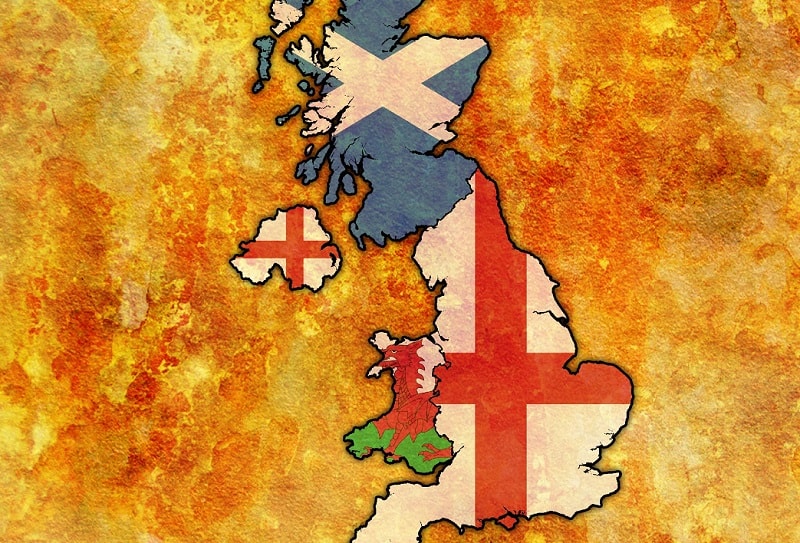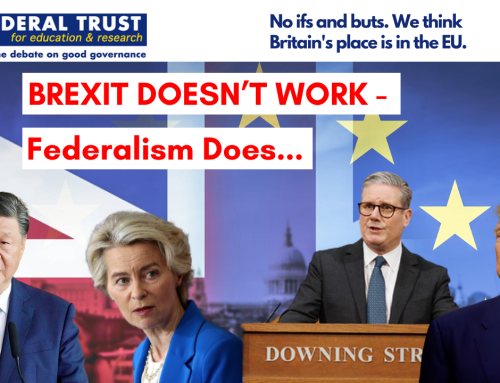Federalism is best defined as a system in which constitutional authority is divided between a ‘federal’ tier of government and a set of territorial ‘states’. It is a comprehensive and symmetrical model in which the entirety (or almost the entirety) of the country is covered by states, which have identical sets of powers. The allocation of powers between them and the federal tier is set out in a constitutional text, ultimately interpreted and enforced by the courts, also charged with upholding individual rights as set out in the constitution. Discourse surrounding United Kingdom (UK) membership of the European Union (EU) has often centred on the federal nature or otherwise of the EU. This tendency has made the proper assessment of federalism in its domestic British context more difficult to achieve. Yet at the same time, the departure from the EU that this interpretation of the concept of federalism helped bring about has increased the political salience of the idea of a UK federation. Politicians might now feel more able than they once did to talk openly about a federal UK. But the necessary thorough consideration of how to apply this model to the UK, and its viability and likely outcomes, has yet to take place.
One of the by-products of the decades-long campaign against European integration in the United Kingdom (UK) has been a contamination of political language and perception of the concepts it conveys. Considered objectively, the ‘federal’ label is arguably appropriate to the EU. As an entity that concentrates at its centre important legal authorities – for instance, for the protection of rights and the regulation of trade – while leaving others to individual member states, the EU has a federal quality to it. But generally in the UK the word federal was attached to the EU and predecessor organisations not to describe, but to denigrate. Such apprehensions focused on federalism in its centralising aspects. While concern about tendencies of this type can be proper, to employ the term federalism in this context is to overlook that it is in the nature of such a model that the powers of the centre and of the ‘states’ are constitutionally defined, and that federalism therefore contains inbuilt protections against excessive centralisation. Such criticism of European ‘federalism’ rested on the assumption that this character of the integration project made it incompatible with the traditional autonomy of the UK constitution. According to this rhetorical approach, membership could be seen, by extension, as undesirable.
The premise that federalism was in some way a problem commanded general consensus across different sides of the European debate. Those who disagreed with this characterisation of the EU and the UK relationship with it tended to do so by claiming that the EU either was not as ‘federal’ as was claimed, or that it would be possible to resist such a tendency, or exempt the UK from it. Eurosceptic rhetoric was not the sole reason for a lack of meaningful attention to the possibility of a UK federation. Various long-term political and cultural tendencies have played a part. But the rise of Euroscepticism from the 1990s onwards played an important part in contaminating the federal idea. This toxification took place during the very period when a serious appraisal of federalism and its possible internal application to the UK should have been judged increasingly necessary. During this time, devolution to parts of the UK was given close political attention, and was eventually enacted for Wales, Scotland and Northern Ireland (becoming live from 1999) as well as, by stages and to a lesser extent, within England.
Devolution is not synonymous with federalism. The Labour government that instigated this programme from 1997 was at pains to distance itself from federalism (presumably partly because of the perceived negative connotations discussed above). But devolution and federalism have points of similarity, and in implementing devolution the UK could be said to have moved in a federal direction, even if that was not the avowed purpose of the shift. As a consequence of devolution, the UK now has a series of territorial sub-units with legislative and tax-raising powers that are to some extent politically entrenched. The system is subject to oversight by a Supreme Court. In this sense it has federal features, with the devolved territories akin to the ‘states’ of a federal constitution, and the UK institutions comprising the federal tier. However, in contrast to the arrangements typically found in federations, the UK lacks a ‘written’ constitution to which all institutions are subject, with the Westminster Parliament retaining ultimate legal ‘sovereignty’. Nor is there a chamber within the UK legislature that gives specific representation to the sub-UK territories. The Joint Ministerial Council, established to provide a forum in which the UK and devolved executives can consult on decisions of mutual importance, is widely regarded as a flawed and ineffective institution. The comprehensive and consistent coverage of a federal constitution is absent. Not every part of the UK has a devolved system, and there remain significant variations between those that exist.
Furthermore, the advent of Brexit has created significant uncertainty about the status of the devolved systems. This event has upset the constitutional balance of the UK. Recurring controversy seems likely over the way in which the UK deploys the new powers over which it has (in theory at least) gained control, for instance, in the field of negotiating and concluding free trade agreements. A very particular set of uncertainties and problems apply to Northern Ireland and its institutions for self-governance, given that they have in effect been separated from the single market and customs union of Great Britain, through an arrangement – the Northern Ireland protocol – the viability of which remains uncertain. Compounding this disruption, Brexit has revived the Scottish independence cause. An outright victory for the Scottish National Party at the forthcoming Scottish Parliament elections, which at the time of writing remains plausible, will intensify debate both about the possibility of a referendum on departure from the UK, and the prospect that voters will choose the independence option if offered it.
In this context the idea of a UK federation is found increasingly alluring across different parts of the political spectrum (as it was previously after the 2014 Scottish independence referendum). Adherents include senior figures within Labour; the Liberal Democrats have a longstanding commitment in this area; and some Conservative voices – perhaps most notably Lord Salisbury (and his cross-party Constitution Reform Group) – are supportive. Federalism can have different implications in different parts of the UK. From the point of view of Scotland, it is seen as a means of offering this nation sufficient control over its own affairs within the Union as to weaken the case for leaving it. In Wales, though an independence movement exists, its success is not as immediate a prospect as it is in Scotland. Federalism might nonetheless be perceived as a means of forestalling increased momentum for independence. It is also perhaps seen as a means of giving Welsh devolution a firmer status, and of providing Wales with a clearer voice in UK-level affairs, alongside the other parts of the UK. In England, federalism can be seen as a means of providing for regional power centres spread across the whole nation. In Northern Ireland, the idea of incorporation into a federal UK is a more complex concept; and some might hold that there should in fact be a federal, unified island of Ireland. Advocates of federalism for the UK might regard it as offering a model for reform of the House of Lords, transforming it into a federal chamber. They tend to regard federation as a means of stabilisation, creating a new consensus around and entrenching a new system.
There are reasons to believe that federalism could be introduced to the UK; and that it could practically be achieved. But it is easier to call for a UK federation in the hope that it will deliver these various outcomes than it is to address the various complexities and underlying questions that such a project raises. They show that, while a federation might be compatible with important aspects of UK political tradition, such as limited government and the rule of law, it also requires a willingness to challenge other embedded concepts. The issues to be considered include:
- How far is it possible to address the incompatibility of the doctrine of parliamentary sovereignty, traditionally regarded as a crucial feature of the UK constitution, with the enforceable division of powers that is central to a federation?
- How would disputes between the different tiers of governance be resolved?
- If the second chamber of the UK Parliament were to be repurposed as a federal body, would it be directly elected, or appointed by the state parliaments and/or governments? What are the implications of either option for the working of the system?
- How much of a role would and should the states be given in determining whole-UK decisions, such as the negotiation and ratification of trade agreements?
- How would England be incorporated into a federation? If England were a single unit, it would not benefit from the meaningful downward transfer of power that has marked devolution. A single English ‘state’ within a federation, given that it would be larger in population and other terms than all the other states combined, might be perceived as over-powerful by the others. Yet measures intended to prevent its domination might be unacceptable to England. Inclusion of a series of English regions could deal with the problem of an overlarge single component. But it might be difficult to establish a series of English states that could command sufficient popular attachment. Moreover, could English regions credibly be regarded as equal parts of a federation alongside the nations of Wales and Scotland?
- What more powers is it possible to transfer to Scotland that have not already been devolved? Moreover, if devolution has not succeeded in preventing the rise of independence sentiment, why should federalism? How is it possible to present a UK federation as more than simply a response to the possibility of Scottish independence?
- If Scotland (and perhaps Northern Ireland) left the UK, would a federal model be applicable to what remained?
- How far is a UK federation a means of addressing the issues faced by Northern Ireland, especially in the post-Brexit environment?
- What is an appropriate process by which a UK federation might be established? How likely is it to succeed in arriving at an acceptable model that can command sufficient levels of support?
Those who favour a UK federation would be advised to start seriously addressing such questions now. Even if they do, it might be that such a project has come too late to preserve the UK in its current form. But just as questions about the relationship between the territories that now comprise the UK and the wider European continent never disappear, neither will the need for the different components of the UK to manage their relationship with each-other. Federalism is a possible means of doing so that has not yet properly been attempted. For this reason federalism and all the complexities it brings require and deserve consideration at a depth they have not often received. Federalism may not be a panacea for the current constitutional problems of the United Kingdom. But it is difficult to believe that the values and insights of federalism have nothing to contribute to the resolution of these problems.







[…] Federalism for the United Kingdom: an answer that raises questions […]